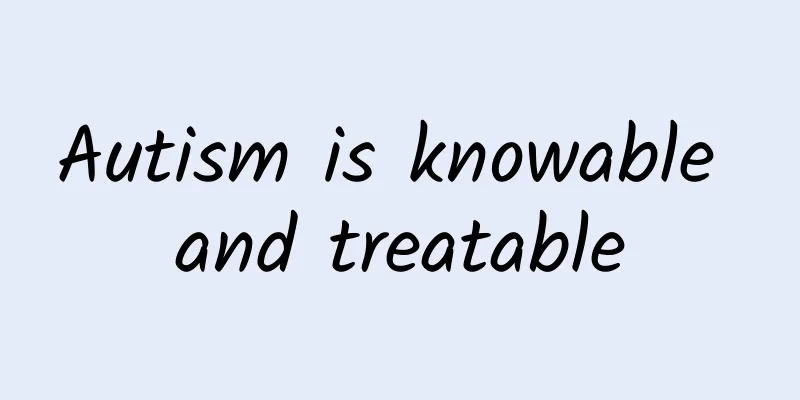Autism is knowable and treatable

|
"Doctor, my three-year-old child still can't speak, doesn't like to play with others, is stubborn and difficult to bring up. Could he be autistic?" "My child is very smart and learns things very quickly. He has no other problems except that he can't speak." “Is there no hope if a child is diagnosed with autism?” Is autism really untreatable? What kind of disease is autism? Let's take a look at autism with many questions from parents. Autism (autism spectrum disorder) refers to a pervasive developmental disorder. A disease with social disorders (social communication and social interaction disorders) as the core, accompanied by narrow interests, stereotyped repetitive behaviors, abnormal perception and other problems that cause functional impairment in patients and seriously affect their social function activities. Is there a definite cause of autism? For many years, the exact cause of autism has been a controversial topic, from the psychiatric theory and refrigerator mother theory (acquired theory) in the early stage of autism research to the current stage of genetics and multiple environmental influences as the cause of the disease. Although medical, educational, psychological and other multidisciplinary experts have never stopped studying the cause of the disease, the exact cause of autism has not yet been found. What are the inherent obstacles of autism? Let's take a look at the following aspects to see how they are different from ordinary people. 1. Social interaction disorder The main manifestations of autism in infancy are "not listening, not looking, not pointing, not responding, not following" - this is the early screening period for autism. During this period, children will not have obvious abnormal behaviors, but they will lack common attention or early social behaviors. Children with autism in early childhood already lack the desire to socialize and pay little attention to other people and things. Specifically, they have no ability to express their needs and communicate, no ability to observe, follow, and imitate, do not listen to instructions in unfamiliar environments, and are not afraid of danger. Family members react that it is difficult to raise them. Social behavior disorders are more prominent in school-age children with autism. Most of them act on their own, cannot follow routines, have difficulty adapting to group activities, and cannot participate in group games that require strong interactions such as understanding turns, waiting, cooperation, exchange, and competition. Social adaptability disorders are particularly obvious during the childhood stage of interacting with others, and even children with better developmental functions find it difficult to maintain social friendships. 2. Language communication barriers Most autistic children have language development disorders, such as no language expression or less vocabulary, talking to themselves without communication meaning (advertising slogans, parrots, etc.), being able to speak but the communication is too simple, and even if they can talk to others, they have only a good grasp of interactive communication language. At the same time, there may be abnormal speech and intonation disorders. 3. Development of stereotyped repetitive behaviors and narrow interests The vast majority of autistic children have different degrees of stereotyped repetitive behaviors. They are manifested in stereotyped memory, a single and limited way of playing, focusing on parts of objects, and accompanied by uncontrollable repetitive behaviors such as running, jumping, turning in circles, and laughing. For example, they like light and shadow, repeatedly operate objects to arrange and classify them, like to rotate round objects, watch the same video repeatedly and rap advertising slogans, repeat routes, and repeatedly go up and down stairs or elevators. Some children can maintain their "uniqueness" in learning. They have a single interest in words, numbers, patterns, letters, etc. Such children seem to be "smart, studious and inquisitive", but in fact they are stereotyped and stubborn, asking questions repeatedly and continuously, and are extremely resistant to changes in things that others ask them to change. Although some autistic children have certain talents in memory and calculation, they have great obstacles in learning social skills and survival skills. 4. Abnormal sensory perception Children with autism have fundamentally different reactions to sensory stimulation in a normal environment than normal people, usually showing oversensitivity or a small part of slow reaction. Generally speaking, they pursue visual stimulation, have abnormal tactile needs, are more sensitive to hearing, have a slow sense of pain, and have abnormal proprioception development. This is also the root cause behind many behavioral problems of autism. In addition to their own diseases, do autistic people have other comorbidities? Let's talk about the comorbidities we must know about—— During treatment, it was found that a considerable number of ASD patients, in addition to the core disorder, may also have multiple comorbidities, such as ADHD (attention deficit hyperactivity disorder), intellectual disability, language disorder, and learning disability, etc. Some people with autism may also suffer from psychological illnesses such as anxiety, depression, and obsession to varying degrees, and may also have medical diseases such as epilepsy, genetic diseases, gastrointestinal diseases, and sleep disorders. The functional impairment caused by the above comorbidities seriously affects the learning and social life of ASD children or adults. Comorbidities have also become a problem that cannot be ignored in rehabilitation treatment. How can we effectively improve the symptoms of autism? After long-term observation of treatment cases, intensive and scientific educational intervention can increasingly effectively help ASD children improve their functional symptoms and enable them to acquire more social functions. As a parent of autistic children, this can help them more effectively 1. Understand the disease correctly and avoid being overly pessimistic or blindly laissez-faire. 2. Actively seek external help, including choosing a nearby professional medical rehabilitation institution for treatment or learning family intervention methods. 3. Understand your child’s personality, choose a scientific, systematic, and personalized training method, proceed step by step, and detect and treat the problem early. 4. While adhering to the principle of systematic and intensive training, children should be prevented from being overly tired. ? Some parents take their children to and from multiple training institutions, which leads to fatigue in their children over time and results in half the effort with twice the results. This approach is not advisable. 5. Believe in the importance of family training! Learn autistic children's training and parenting strategies through multiple channels to achieve a family-involved intervention model. 6. In the process of raising autistic children, parents should try their best to maintain stable emotions, sufficient patience and persistent determination to intervene, which plays a vital role in the growth of autistic children! |
>>: A woman suffered from scrub typhus and respiratory failure, just because of petting a cat?
Recommend
How many pounds is normal for a premature baby at 35 weeks
A premature baby refers to a baby who is born pre...
Is it necessary for women to have a chromosome test?
We all know that chromosome examination occupies ...
Can I do moxibustion during my aunt's period?
Moxibustion is an essential health-preserving too...
What is the reason for the feeling of falling in the stomach during late pregnancy?
In life, we always find that some pregnant women ...
[Medical Science] The mysterious department in the hospital - Pathology Department
1. Why do we need pathology? As a pathologist, it...
Stanford University: Research shows that social media is prevalent with the phenomenon of "social passing"
A study conducted by Stanford University and Face...
What should women eat in autumn? Don't miss these foods
Autumn is a season for health preservation. Women...
What to do if the ovarian follicles are abnormal and how to treat them
If the follicles discharged by a female friend ar...
Greasy hair after pregnancy means boy
For first-time pregnant mothers and fathers, ever...
Female pubic itching
No matter which period a woman is in, she should ...
How to treat cervicitis
The harm caused by cervicitis to our body is simp...
How do girls exercise their genitals?
In daily life, I believe that many female friends...
What can pregnant women eat to relieve acid vomiting?
Morning sickness during pregnancy is very uncomfo...
How should pregnant women prevent stretch marks
Many people will experience many problems during ...
How many days does menstruation last?
Every woman has her period every month, which is ...









